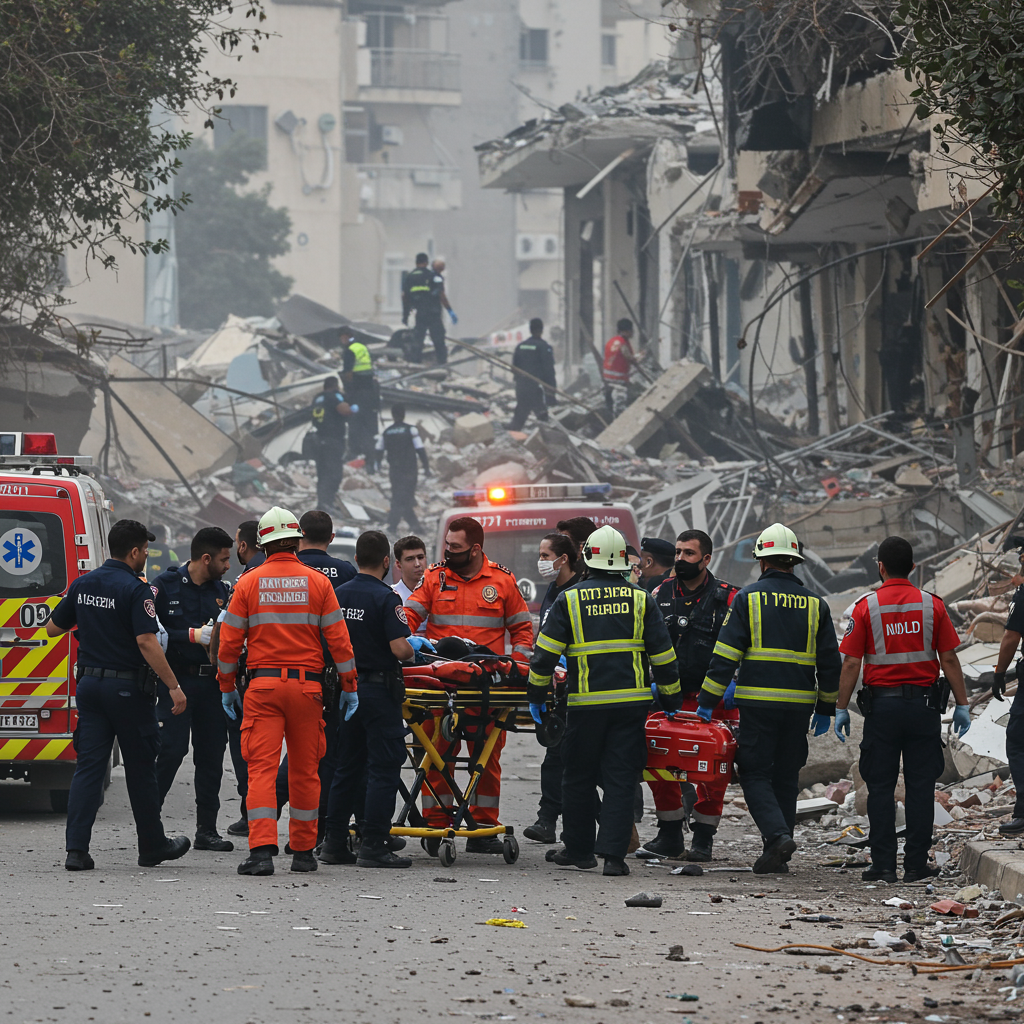Escalating Hostilities: Iranian Strike Hits Northern Israel Amid Intense Conflict
A recent Iranian missile strike targeting northern Israel on Friday injured nearly two dozen people, according to emergency officials. This attack is the latest event in a rapidly intensifying, multi-day conflict that has seen both Iran and Israel exchange deadly strikes across the region, derailing nascent diplomatic efforts.
Emergency services Magen David Adom (MDA) reported that the strike wounded 23 people. Among the injured were three individuals in serious condition, including a 16-year-old boy who suffered severe shrapnel wounds. Two men, aged 40 and 54, also sustained shrapnel injuries to their legs. Tragically, one woman died of a heart attack while seeking shelter during the attack. Damage was also reported at a building in Haifa following the strike.
A Week of Deadly Reciprocal Attacks
The Friday strike occurred amidst a week of unprecedented, direct state-on-state hostilities between Iran and Israel. What began days earlier has escalated into a full-blown exchange of missile and drone attacks, moving beyond proxy conflicts.
Earlier on the same Friday, the Israeli military announced it had conducted extensive strikes within Iran, utilizing 60 jets to target 25 military and nuclear facilities. An Israeli military official claimed that Iran’s Friday response involved launching approximately 20 missiles at Israel. This was not the only Iranian strike that day; an Iranian missile also hit the southern Israeli city of Be’er Sheva on Friday morning.
The human cost of this escalation has been devastating. Across the week, figures on casualties vary, highlighting the chaos of the conflict. Reports suggest at least 639 people have been killed in Iran since the Israeli strikes began, including a significant number of civilians – potentially over 260, according to a Washington-based human rights group, which estimates the official figures may be underreported. Israeli officials, meanwhile, report that at least 24 people in Israel have been killed by Iranian attacks over the same period, including multiple children.
Beyond the Friday strike, other Iranian attacks during the week have hit major Israeli cities like Tel Aviv, Haifa, and Jerusalem, causing significant damage and civilian casualties. A particularly devastating strike in the southern Tel Aviv suburb of Bat Yam hit a residential building, resulting in multiple fatalities in what was described as one of the deadliest Iranian strikes against Israel. Strikes have also impacted infrastructure, including Israel’s largest oil refinery in Haifa Bay, which caught fire. Civilian areas across central Israel, including Petah Tikva and residential neighborhoods in Tehran, have also suffered hits. Notably, a missile struck Soroka Medical Center in Beersheba, damaging a building, though Iran denied deliberately targeting the hospital.
Israeli strikes in Iran have targeted military command centers, missile launchers, and key nuclear facilities in locations like Natanz and Isfahan. While Israel claims significant success in degrading Iran’s nuclear capability with these strikes, analysts note that deeply buried sites like Fordow may require specific capabilities, such as advanced U.S. bunker-buster bombs, to neutralize. Iran’s state media and human rights groups have reported hundreds killed and thousands injured in these Israeli bombardments across the country. High-ranking Iranian officials, including senior IRGC intelligence and air force commanders, have reportedly been killed in the strikes on Tehran. Civilian life in Tehran has been severely disrupted, with panic leading many residents to attempt to flee the city and authorities opening public buildings as shelters.
Diplomacy Falters Amidst Rising Tensions
The surge in military action has overshadowed and significantly complicated diplomatic efforts. European foreign ministers met with Iranian Foreign Minister Abbas Araghchi in Geneva on Friday in an attempt to negotiate a settlement to the conflict and address concerns about Iran’s nuclear program.
However, the prospects for meaningful dialogue appeared dim. Ahead of the Geneva meeting, Araghchi stated that Iran had “nothing to discuss” with the United States as long as Israel continued its strikes. While expressing openness to dialogue with others, he drew a firm line, stating that Iran’s defense capabilities were “not negotiable.” After the talks, Britain’s foreign secretary, David Lammy, confirmed that the Europeans were “keen to continue ongoing discussions” but reiterated the clear message that Iran “cannot have a nuclear weapon.” Araghchi indicated Iran was “ready to consider diplomacy once again” and expressed readiness to meet again.
Behind the scenes, U.S. Special Envoy Steve Witkoff has reportedly engaged in direct phone conversations with the Iranian Foreign Minister, marking the most substantive U.S.-Iran contact in months. However, Iran has reportedly informed the U.S. that it will not return to broader talks unless Israeli attacks cease.
U.S. President Trump commented on the situation, acknowledging that the U.S. has been speaking to Iran. However, he remarked that it would be “very hard right now” to request that Israel pause its offensive against Iran, particularly if “somebody’s winning,” as Iran has demanded. Reports also suggest Trump recently signaled a temporary pause on potential U.S. military action against Iran to see if diplomatic efforts gain traction, but is weighing options, including striking heavily fortified sites like Fordow.
Wider Implications and Regional Stability
The escalation has raised fears of a wider regional conflict. Casualties are also mounting in related conflicts; for example, dozens of Palestinians were killed in Gaza on Friday amidst continued Israeli strikes there, with humanitarian aid access severely restricted, leading the UN to warn of starvation risks.
International reactions have included calls for de-escalation from powers like Russia and China, who have also condemned Israeli strikes. European Union foreign ministers were scheduled to discuss the crisis. Airlines have suspended flights to the Middle East due to the heightened tensions, and countries have issued travel warnings or facilitated the evacuation of their citizens. Threats against U.S. personnel in the region have also emerged from pro-Iranian groups if the U.S. becomes directly involved.
As the conflict rages, the intertwined issues of military escalation, stalled diplomacy, and the critical concern over Iran’s nuclear program leave the Middle East in a precarious state, with no immediate resolution in sight.



